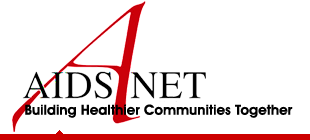
AIDSNET History
AIDSNET traces its history to the early days of the epidemic. By the mid-1980's, it was evident that the community's response to AIDS would
require strong leadership. However, the newness of the epidemic had not allowed for the development of a comprehensive approach by the local
agencies. Limited information about the basic nature of AIDS, as well as a lack of resources to help those infected, resulted in an inadequate
public health response. This fragmented response may have served to meet immediate needs, but it was clear that a more unified approach was
needed.
By 1989, most of the limited state funds being spent on the epidemic were being allocated to the large metropolitan areas. But the epidemic
was clearly spreading to the smaller cities in the state, such as those in the AIDSNET region. In August 1990, the Ryan White Comprehensive
AIDS Resource Emergency (CARE) Act was signed into law. Title II of the Act (now called Part B) directed that formula-based funding would be
awarded to the states, including the Commonwealth of Pennsylvania.
In October 1990, two months after the passage of the Ryan White CARE Act, the PA-DOH announced a new decentralized HIV planning strategy
with the creation of seven regional consortia.
In July 1991, the AIDS Long Range Planning Coalition, a year-long initiative of the United
Way of Lehigh, Northampton and Warren Counties and supported by a grant from the Dorothy Rider Pool Health Care Trust, developed a plan for
meeting the needs of people living with HIV/AIDS in the region. In implementing the AIDS Regional Long Range Plan, the six-county regional
HIV care coalition known as AIDSNET was formed to continue to provide leadership, advocate for HIV-infected persons and plan realistically
for a coordinated and integrated health and human services system. Funding was solicited and received from the Pennsylvania Department of
Health and the Pool Trust Fund.
In August 1991, AIDSNET began facilitating the development of a regional network for the delivery of educational, preventive, and
health and human services to individuals with HIV infection, and individuals at risk for and affected by HIV. The United Way of Lehigh,
Northampton and Warren Counties served as the lead agency providing fiscal and administrative oversight. The role of AIDSNET included needs
assessment and planning, building community awareness, cooperation/coordination, education/prevention, advocacy, clearinghouse,
resource development, implementation and self-evaluation functions. AIDSNET would also forge partnerships between business, industry,
policy makers, the voluntary sector, and health and human service organizations. Fiscal year July 1992 – June 1993 was the first year
AIDSNET entered into subcontracts with providers.
On February 16, 1994, AIDSNET was incorporated as a non-profit organization and officially
began operating on its own on July 1, 1994. AIDSNET decided to incorporate so it could operate as its own fiscal agent.
Incorporation provided additional flexibility for the organization and the ability to attract supplemental funding through
granting organizations.
Over the years, AIDSNET has earned the respect of service providers, consumers, funding sources and others
interested in preventing the spread of HIV/AIDS. The organization's reputation is based on its desire to partner with other organizations,
working toward the goal of providing better services to those who are at risk, as well as those infected with and affected by the disease.
AIDSNET has strong administrative procedures, as evidenced by clean audits, as well as strong programmatic and administrative evaluations,
which provides comfort to supporters of the organization.
